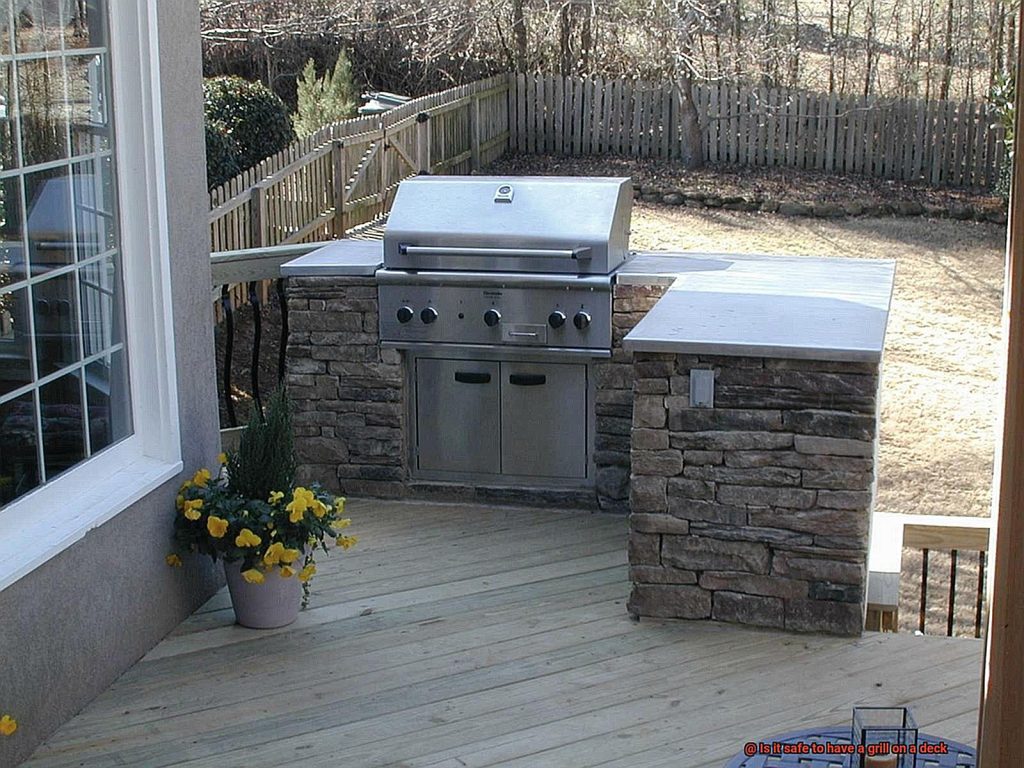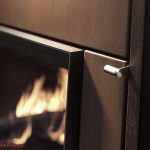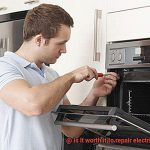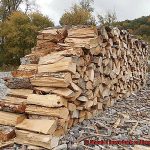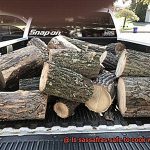It’s that time of year again – the sun is shining, the birds are chirping, and the smell of grilled goodness is in the air. But before you start flipping burgers on your deck, there’s one crucial question to consider: is it safe to have a grill on a deck?
This is a dilemma faced by countless homeowners who want to enjoy their outdoor living space without compromising safety. After all, grills can be hazardous if not used properly, and nobody wants to put their loved ones or property at risk.
But fear not. In this blog post, we’ll delve into the nitty-gritty of grilling on a deck and equip you with all the information you need to grill safely and confidently. From different types of grills to essential safety precautions, we’ve got you covered.
We’ll also explore how your deck’s materials can affect grill safety – because let’s face it, nobody wants to scorch their beautiful wooden deck or worse yet, start a fire.
So if you’re planning on hosting a backyard BBQ this summer, read on. We’ve got all the tips and tricks you need to ensure your grill stays where it belongs – on your deck and out of harm’s way.
Contents
Types of Deck Materials and Fire Hazards
Before grilling on your deck, it’s important to consider the fire hazards associated with different types of deck materials. Here are five sub-sections explaining the different types of deck materials and their associated fire hazards.
Fire-Resistant Wood Decks:
Wood is one of the most popular materials for decks, but it’s also highly flammable. However, some types of wood are more fire-resistant than others. For example, cedar and redwood contain natural oils that make them less prone to ignition. Pressure-treated lumber, on the other hand, is treated with chemicals that make it resistant to rot and insects but highly flammable. To minimize the risk of fire hazards, choose fire-resistant types of wood and keep your deck well-maintained.
Composite Decks:
Composite decking is made from a combination of wood fiber and plastic, making it less flammable than traditional wood decking. However, it’s still important to exercise caution when using a grill on composite decking to avoid any potential fire hazards.
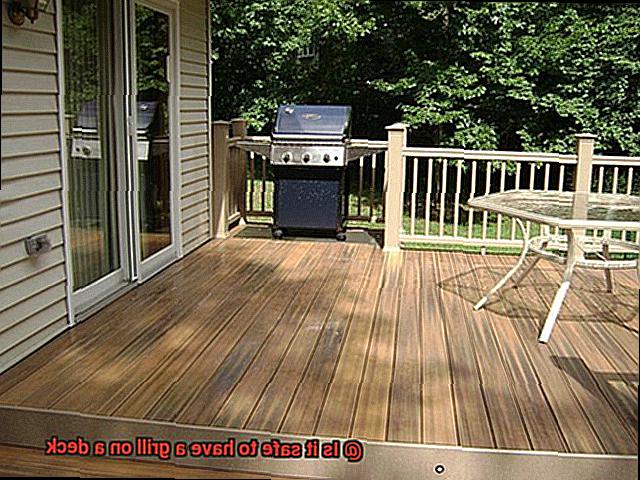
Metal Decks:
Metal decking is the most fire-resistant option for decks because it can withstand high temperatures and is less likely to catch fire than other materials. However, metal decks can become very hot when exposed to direct sunlight, which can pose a risk if accidentally touched.
Fire Hazards:
Regardless of the type of material used for your deck, there are certain fire hazards to consider when grilling. Overhanging branches or nearby foliage can catch fire from sparks or embers, while combustible materials like furniture or cushions pose a risk if they’re too close to the grill. Windy conditions can also spread flames or blow sparks onto nearby surfaces, and grease buildup on or around the grill can ignite.
Precautions:
To minimize these risks, always keep the area around the grill clear of combustible materials, choose a safe location for your grill away from overhanging branches or nearby foliage, monitor windy conditions, and keep your grill clean and well-maintained. By taking these precautions and being aware of the fire hazards associated with different types of deck materials, you can enjoy grilling on your deck safely and without any safety concerns.
In conclusion, choosing the right deck material plays a crucial role in minimizing the risk of fire hazards when grilling on your deck.
Location of the Grill: Keeping it at a Safe Distance from Flammable Objects
Grilling on your deck can be a fantastic way to enjoy the outdoors and cook up some mouth-watering meals. However, it’s important to keep in mind that grilling can also pose a significant fire hazard. That’s why it’s crucial to take precautions and ensure that your grill is located at a safe distance from flammable objects.
To help keep you and your property safe, let’s explore some essential sub-topics to consider when it comes to the location of your grill:
Firstly, the National Fire Protection Association (NFPA) recommends keeping your grill at least 10 feet away from any combustible materials. These materials include not only wood but also plastics, papers, and even propane tanks. By keeping this distance, you greatly reduce the risk of any embers or sparks igniting nearby flammable objects.
Secondly, it’s crucial to make sure that there are no low-hanging branches or power lines near the grill. These objects can easily catch fire from the heat of the grill or any sparks that may fly from it. Therefore, it’s always best to position your grill in an open area with plenty of clearance around it.
Thirdly, if space is limited on your deck, consider adding a heat shield or fire-resistant barrier between the grill and any nearby structures. This extra layer of protection can help prevent any accidental fires from occurring.
Lastly, pay attention to the wind direction and always position the grill so that it faces away from any prevailing winds. By doing so, you can prevent any sparks or embers from being blown onto flammable materials and potentially starting a fire.
Proper Ventilation for Grilling on a Deck
Before you do so, it’s essential to consider the importance of proper ventilation. Without adequate ventilation, smoke and fumes from the grill can accumulate and pose a health hazard. Moreover, excessive smoke buildup can also cause a fire, putting your home and your neighbors’ property at risk.
To ensure that you have a safe and enjoyable grilling experience, here are some tips on proper ventilation for grilling on a deck:
- Position the grill in an open area: When setting up your grill, make sure to place it in an open area that allows for good air circulation. Avoid placing it near walls, railings or any other obstructions that may impede airflow.
- Consider wind direction: Be mindful of the direction of the wind when positioning your grill. Placing it in an area where the wind could blow smoke and fumes towards your house or your neighbor’s property is not advised. If this is unavoidable, consider installing a windbreak or a smoke hood to redirect the smoke away from your home.
- Use a grill with adjustable vents: A grill with adjustable vents allows you to control the amount of air flow into and out of the grill, which can help regulate cooking temperature and prevent excessive smoke buildup.
- Clean your grill regularly: Regular cleaning of your grill is crucial in improving ventilation by removing any grease buildup that may obstruct airflow. After each use, clean your grill thoroughly and inspect it regularly for any signs of damage or wear that could affect its performance.
Cleaning the Grill Before Use
Grilling is a beloved pastime enjoyed by many, but it’s important to remember that cleaning the grill before use is just as important as cooking on it. A dirty grill can lead to food contamination and fire hazards, putting your health and safety at risk. Therefore, it’s crucial to clean the grill before use to ensure safe and delicious grilling every time.
There are several reasons why cleaning the grill before use is a must:
- Prevents Food Contamination: A dirty grill can harbor harmful bacteria, germs, and other contaminants that can transfer onto your food. Cleaning the grill helps remove any leftover bits of food, grease, and bacteria that can affect the quality and safety of your meal.
- Reduces Fire Risks: A buildup of grease and debris on the grill can ignite a fire, posing a danger to you and your property. By cleaning the grill before use, you reduce the risk of flare-ups and prevent potential fire hazards.
- Improves Performance: A clean grill heats up faster, cooks food more evenly, and prevents hot spots. It also helps prevent smoke buildup that can cause health issues and affect the taste of your food.
Now that you know why cleaning the grill before use is important let’s look at some tips on how to clean it effectively:
- Preheat the Grill: Preheat your grill for 10-15 minutes before brushing it off. This makes it easier to remove any residue or debris.
- Use a Wire Brush: Use a wire brush to scrub off any remaining debris or residue from the grates. Make sure to remove all debris from the grates as this can affect the taste of your food.
- Wipe Down Grates: After brushing off the grates, use a damp cloth or paper towel to wipe them down thoroughly.
- Deep Clean Periodically: In addition to regular cleaning, perform deep cleanings periodically by disassembling the grill and cleaning each component thoroughly. This ensures that your grill is in top shape and helps prolong its lifespan.
It’s important to note that different types of grills require different cleaning methods. Gas grills should be turned off and disconnected from the propane tank before cleaning, while charcoal grills should be emptied of ash before cleaning.
Safety Tips for Grilling on a Deck
Grilling on a deck is a great way to enjoy the outdoors and cook up some delicious meals for your loved ones. However, it’s important to keep in mind that grilling can be dangerous if proper safety measures are not taken. Here are five tips to help you grill safely on your deck:
Check Your Grill’s Manual
The first step to safe grilling is reading the manufacturer’s instructions carefully. Ensure that your grill is safe to use on wood or any combustible surface before setting it up on your deck. Different grills have different requirements, so it’s essential to read the manual carefully.
Keep Your Grill Away from the House
Ensure that your grill is at least 10 feet away from anything combustible, whether it’s your house, deck railing, or overhanging branches. This will help prevent accidental fires from spreading and causing damage.
Use a Fire-Resistant Mat
Consider placing a fire-resistant mat underneath your grill to protect your deck from any grease or hot coals that might fall. This can also help prevent damage to your deck and make cleaning up easier.
Keep a Fire Extinguisher Nearby
Always have a fire extinguisher nearby in case of an emergency. It’s also a good idea to know how to use it before you start grilling. Remember, accidents can happen quickly, so it’s essential to be prepared.
Clean Your Grill Regularly
Regularly cleaning your grill can help prevent grease buildup and reduce the risk of a fire. Empty the grease tray after each use and scrub the grates after several uses.
Bonus Tip: Be Mindful of the Weather Conditions
Lastly, be mindful of the weather conditions when grilling on your deck. Windy conditions can cause flames to spread quickly, so it’s best to avoid grilling on particularly windy days.
Benefits of Grilling on a Deck
Grilling on a deck is not only a trendy way to cook your meals, but it also comes with numerous benefits that make it an excellent option for those who love to cook outdoors. Let’s explore some of the benefits in detail.
Firstly, nothing beats enjoying the beautiful outdoor scenery while cooking your favorite meals. With a grill on your deck, you can take in the fresh air and sunshine while sizzling up some juicy steaks or veggies. It’s the perfect way to unwind after a long day at work and enjoy the beauty of nature.
Secondly, grilling on a deck is convenient and hassle-free. You can easily move your grill from storage to the deck, eliminating the need to carry it up and down stairs or across uneven terrain. Additionally, having your grill on your deck means you don’t have to go far to get supplies or utensils. Everything you need is right there, making your grilling experience enjoyable and fuss-free.
Thirdly, grilling on a deck can add value to your home. Outdoor living spaces are highly desirable among buyers, and having a grill on your deck can make it more attractive to potential buyers if you ever decide to sell your home. It’s not only about enjoying a delicious meal but also about investing in your home’s value.
Lastly, safety is always a concern when it comes to outdoor cooking options. Grilling on the ground can be dangerous due to the risk of fire, but having a grill on a sturdy deck with proper ventilation can reduce the risk of accidents significantly. This means you can focus on perfecting your grilling skills without worrying about safety hazards.
Also Read: Use A Pellet Grill Under A Covered Patio, Porch, Deck
Conclusion
Grilling on a deck is a quintessential summer activity that can bring joy and flavor to your outdoor gatherings. However, it’s crucial to prioritize safety to avoid any potential hazards that could ruin your fun.
To ensure safety, choosing the right deck material is essential in minimizing the risk of fire hazards when grilling. Keeping your grill at a safe distance from flammable objects is also important. Proper ventilation is key to prevent smoke and fumes from accumulating and posing health risks.
Don’t forget to clean your grill before use as a dirty grill can lead to food contamination and fire hazards. It’s equally important to implement safety precautions such as checking your grill’s manual, keeping a fire extinguisher nearby, using a fire-resistant mat, and cleaning your grill regularly.
Grilling on a deck offers numerous benefits such as enjoying the beautiful outdoor scenery while cooking your favorite meals, convenience, adding value to your home, and most importantly – safety. With these tips and tricks in mind, you can confidently plan that backyard BBQ this summer without compromising the safety of yourself or loved ones.

